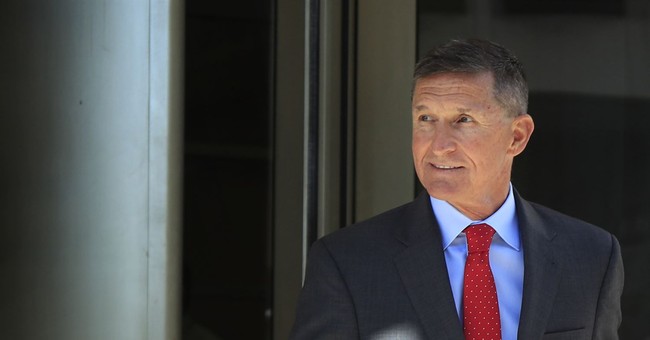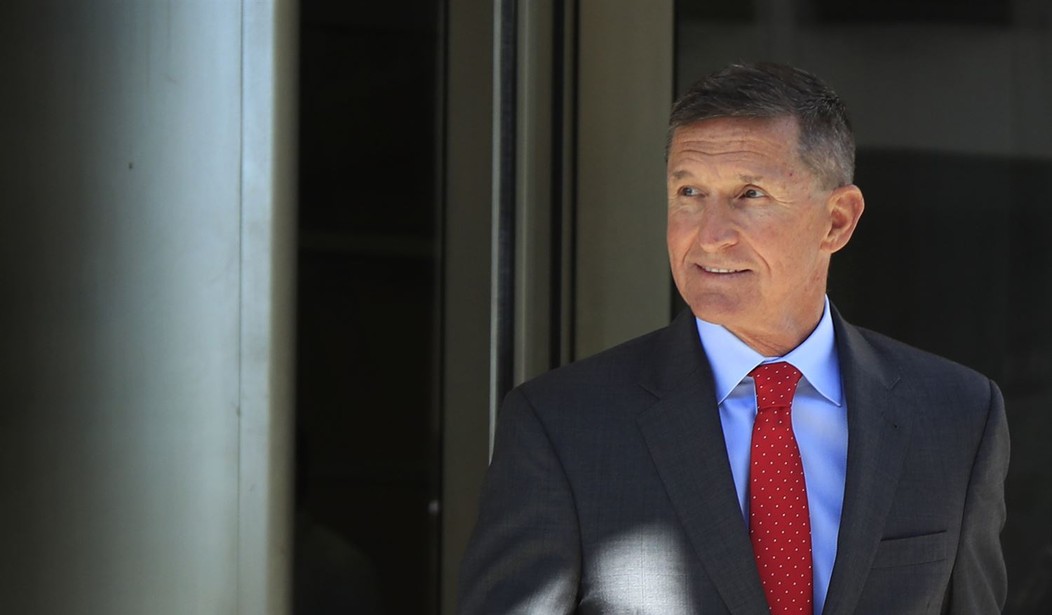
Normally when the prosecution decides to drop a criminal case, it’s dropped. It’s pretty hard to proceed without a prosecution.
But astonishingly, that hasn’t been the reaction of Judge Emmet Sullivan in the case of Gen. Michael Flynn.
What makes this a little different and why it’s up to the judge is because there’s an entered guilty plea on the record with a pending motion by Flynn’s attorney’s to withdraw it at the time the DOJ is requesting dismissal. So it’s technically up to the judge to decide although given the case law, he likely doesn’t have the discretion.
But instead of just dismissing, as one might normally do, he’s made two very troubling moves as we’ve previously reported.
First, he asked for amicus briefs, a highly unusual move for a plea at the trial level particularly since this has been something he hasn’t been willing to allow in the past. It invites the process to become a circus.
Second, he appointed a retired judge, John Gleeson, to present the argument against the government’s request for dismissal. What the heck? Again, pretty fair to say that would be unheard of when both sides in the case are asking for a dismissal.
BREAKING: Judge SULLIVAN has appointed retired judge to argue against the government's motion to dismiss the charge against Flynn. pic.twitter.com/OUGyAbNcIB
— Kyle Cheney (@kyledcheney) May 13, 2020
Moreover, he wants Gleeson to address the question in his brief as to why Flynn should not be charged with criminal contempt for perjury for pleading guilty to the charge originally.
This again is unheard of by the judge. Why? Because he’s basically usurping the power of the Executive branch to handle the case. He’s nullifying the right to withdraw one’s plea by penalizing the defendant for doing so and covering his own actions in accepting a plea where there’s a questions as to whether he accepted it without a proper factual basis.
There are a lot of issues there, some of which we’ve already reported on, but I wanted to address the question of why he’s doing this.
Basically he’s inviting people to respond with briefs (which he will allow at his own discretion), he’s asked this judge to basically act as a substitute prosecutor through amicus (again a problem) to specifically argue in opposition.
This is odd not only on the face of it but, as attorney Victoria Toensing points out, because of the judge’s own prior behavior.
Does Judge Sullivan read SupCt decisions? Last week SupCt held using amici was “drastic departure” and “abuse of discretion.” Why amici for @GenFlynn now when Judge refused Flynn friends amici 24 times. Judge shld be removed from case…then from Bench. #obamagate #maga
— Victoria Toensing (@VicToensing) May 13, 2020
Gleeson is not a party to the case and has already revealed a bias on the matter as shown by his Washington Post op ed.
Former Judge John Gleeson – the amicus appointed by Judge Sullivan – has already judged the case.
"The [Flynn] record reeks of improper political influence."
Seems to say a lot about Judge Sullivan's motives.
Even his amicus is biased. pic.twitter.com/egaMGgEPAk
— Techno Fog (@Techno_Fog) May 13, 2020
Gleeson, while having no legal stake in the Flynn case, does have some connections to the whole Obamagate scenario.
I’m just astonished that there’s been so little discussion tonight about the fact that Gleeson’s firm, Debevoise, represents the despicable “Resistance” heroine Sally Yateshttps://t.co/TB0KYxK818
— Ron Coleman (@RonColeman) May 14, 2020
Per the great @RonColeman –
Flynn Amicus John Gleeson's law firm represented Sally Yates and fought against her testifying before the House.
Gleeson's firm was present with Yates during her testimony. pic.twitter.com/5LLrIAxnM9
— Techno Fog (@Techno_Fog) May 14, 2020
It turns out that Flynn amicus John Gleeson once worked with (and allegedly supervised) Mueller prosecutor Andrew Weissmann.
Curious if Gleeson and Weissman have talked recently. https://t.co/IDITqYjxXe
— Techno Fog (@Techno_Fog) May 14, 2020
So Sullivan has no real power to keep it going and even if he did he would still be overturned on appeal as an abuse of discretion.
So while one might argue all the legal issues, the real issue is why go through all this rigamarole rather than dismiss it? Or if you think it shouldn’t be dismissed, go straight to sentencing (although you’ll get dumped on appeal)?
Could the reason really be all about the delay?
Why is he setting a “scheduling order” and appointing this retired judge? Is he kidding? That’s an indication that he doesn’t see ending this quickly.
If this goes on, it could flip the script on the clear abuse by the Obama administration here and have all kinds of briefs excoriating the actions of the Attorney General and the Trump DOJ as “improper” in the run up to November. It could prevent the “win” of freeing Flynn because of the clear abuse by muddying the waters and in the run up to the election, have people attacking Trump and Barr through the briefs which of course the media would run with rapt attention.
Two, there’s another speculation.
From Wall Street Journal via Townhall:
This is a criminal case subject to normal rules of evidence that were clearly violated by Mr. Mueller’s prosecutorial team. Our friends at the New York Sun speculate that Judge Sullivan may want to keep the prosecution going for months so a Biden Justice Department could revive it. We hope that’s wrong, though we do recall that Judge Sullivan some months back in open court asked prosecutors if Mr. Flynn might have been charged with “treason.”
One issue here is the role of a judge in the U.S. system, which is to adjudicate cases and controversies, not to supplant the prosecutorial duty of the executive branch. There’s also the matter of simple fairness. Mr. Flynn has endured three years of public trial because he was caught up in the Russia collusion allegations that turned out to be based on nothing more than Russian disinformation.
…These extraordinary moves by the court are increasingly discomforting. This is a single charge where significant jail time was neither warranted nor expected. The Court's effort to import arguments and explore new charges could be raised on appeal given the prior record…
— Jonathan Turley (@JonathanTurley) May 14, 2020
…there comes a point where the Court appears too invested in the punishment of a defendant and too active in creating alternatives to dismissal. As a criminal defense attorney, I find these moves unnerving, particularly when prosecutorial abuse has been raised by DOJ and others
— Jonathan Turley (@JonathanTurley) May 14, 2020
Indeed.













Join the conversation as a VIP Member